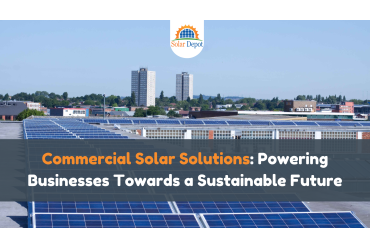Commercial Solar Solutions: Powering Businesses Towards a Sustainable Future
Commercial Solar Solutions: Powering Businesses Towards a Sustainable Future
As the world increasingly embraces sustainable energy sources, commercial solar solutions have emerged as a pivotal component in the transition towards greener business operations. Solar energy not only offers a cost-effective alternative to traditional power sources but also contributes significantly to reducing the carbon footprint of businesses. This comprehensive guide explores the various aspects of commercial solar solutions, from their benefits and types to implementation strategies and future trends.
Understanding Commercial Solar Solutions
What are Commercial Solar Solutions?
Commercial solar solutions refer to solar power systems designed specifically for commercial buildings and operations. Unlike residential solar installations, these systems are typically larger and tailored to meet the higher energy demands of businesses. They can be installed on rooftops, parking lots, or ground-mounted in large open spaces.
Types of Commercial Solar Solutions
- Rooftop Solar Panels: Installed on the roofs of commercial buildings, these systems make efficient use of available space without requiring additional land.
- Ground-Mounted Solar Systems: Ideal for businesses with ample land, these systems are installed on the ground and can be scaled to meet high energy demands.
- Solar Carports: These structures provide shaded parking for vehicles while generating solar power, offering dual benefits for businesses.
- Solar Farms: Large-scale solar installations that generate significant amounts of electricity, often used by energy-intensive industries or sold back to the grid.
Benefits of Commercial Solar Solutions
Cost Savings
One of the most compelling reasons for businesses to invest in commercial solar solutions is the potential for substantial cost savings. By generating their own electricity, businesses can reduce their reliance on expensive grid power, leading to lower energy bills.
- Reduced Energy Bills: Solar panels generate electricity from sunlight, which is free. This reduces the amount of electricity businesses need to purchase from the grid.
- Incentives and Tax Benefits: Many governments offer financial incentives, tax credits, and rebates to businesses that invest in solar energy, further enhancing the economic benefits.
Environmental Impact
Switching to solar energy allows businesses to significantly reduce their carbon footprint. This not only helps in combating climate change but also enhances the company’s reputation as a sustainable and environmentally responsible organization.
- Reduction in Greenhouse Gas Emissions: Solar energy production does not emit greenhouse gases, making it a clean and renewable energy source.
- Sustainability Goals: Implementing solar solutions aligns with global sustainability goals and demonstrates a commitment to environmental stewardship.
Energy Independence and Security
Commercial solar solutions provide businesses with energy independence and security by reducing their reliance on external power sources. This is particularly beneficial in regions with unstable energy supplies or frequent power outages.
- Stable Energy Supply: Solar power systems with energy storage solutions can provide a reliable and consistent power supply, even during grid outages.
- Protection Against Rising Energy Costs: By generating their own electricity, businesses can shield themselves from fluctuating energy prices and rising utility costs.
Enhanced Property Value
Investing in commercial solar solutions can enhance the value of business properties. Solar installations are seen as upgrades that improve the energy efficiency and sustainability of a property, making it more attractive to potential buyers or tenants.
Competitive Advantage
Businesses that adopt solar energy solutions can differentiate themselves from competitors by showcasing their commitment to sustainability and innovation. This can enhance brand image, attract environmentally conscious customers, and improve employee satisfaction.
Implementing Commercial Solar Solutions
Conducting a Feasibility Study
Before investing in commercial solar solutions, it is essential to conduct a comprehensive feasibility study. This involves evaluating the site’s solar potential, assessing energy needs, and analyzing financial implications.
- Solar Potential Assessment: Evaluating the amount of sunlight the site receives and identifying the best locations for solar panel installation.
- Energy Audit: Assessing current energy consumption to determine the size and capacity of the solar system required.
- Financial Analysis: Estimating the costs, potential savings, and return on investment (ROI) to ensure the financial viability of the project.
Choosing the Right Solar Solution
Selecting the appropriate type of solar solution depends on various factors, including available space, energy requirements, and budget.
- Rooftop vs. Ground-Mounted Systems: Deciding between rooftop installations and ground-mounted systems based on the property’s characteristics.
- Solar Carports: Consider solar carports if the business has extensive parking facilities.
- Hybrid Systems: Combining different types of solar installations to maximize energy generation and flexibility.
Partnering with a Reputable Solar Provider
Working with an experienced and reputable solar provider is crucial for the successful implementation of commercial solar solutions. The provider should offer comprehensive services, including system design, installation, maintenance, and support.
- Expertise and Experience: Ensuring the provider has a proven track record in commercial solar installations.
- Quality of Equipment: Using high-quality solar panels, inverters, and other components to ensure efficiency and longevity.
- Ongoing Support: Offering maintenance and support services to keep the solar system running efficiently.
Installation and Commissioning
The installation phase involves mounting the solar panels, setting up the inverters and energy storage systems, and connecting the system to the grid (if applicable). Once installed, the system undergoes testing and commissioning to ensure it operates correctly and efficiently.
- Site Preparation: Preparing the site for installation, including any necessary structural modifications.
- System Installation: Mounting solar panels, installing inverters and batteries, and setting up monitoring systems.
- Testing and Commissioning: Verifying system performance and ensuring compliance with safety and regulatory standards.
Future Trends in Commercial Solar Solutions
Advancements in Solar Technology
Ongoing advancements in solar technology are making commercial solar solutions more efficient and cost-effective. Innovations in solar panel efficiency, energy storage, and smart grid integration are set to revolutionize the industry.
- High-Efficiency Solar Panels: New technologies are improving the efficiency of solar panels, enabling more energy generation from the same surface area.
- Energy Storage Solutions: Advanced battery technologies are enhancing energy storage capabilities, allowing businesses to store excess energy for use during non-sunny periods.
- Smart Grid Integration: Integrating solar systems with smart grids for optimized energy management and distribution.
Corporate Sustainability Initiatives
Businesses are increasingly recognizing the importance of sustainability and are incorporating solar energy into their corporate social responsibility (CSR) initiatives. This trend is expected to drive further adoption of commercial solar solutions.
- Sustainability Goals: Setting ambitious sustainability targets, including the adoption of renewable energy sources like solar power.
- Green Certifications: Pursuing certifications such as LEED (Leadership in Energy and Environmental Design) to demonstrate commitment to sustainability.
Policy and Regulatory Support
Government policies and regulations play a significant role in promoting the adoption of commercial solar solutions. Incentives, subsidies, and favourable regulations are expected to continue supporting the growth of the solar industry.
- Incentives and Subsidies: Financial incentives and subsidies that reduce the cost of solar installations.
- Regulatory Frameworks: Policies that encourage the use of renewable energy and support the development of solar infrastructure.
Integration with Other Renewable Technologies
The future of commercial solar solutions lies in the integration with other renewable energy technologies, such as wind and geothermal energy. Hybrid systems that combine multiple renewable sources can provide more reliable and consistent energy supply.
- Hybrid Renewable Systems: Combining solar power with other renewable sources to enhance energy reliability and efficiency.
- Microgrids and Mini-Grids: Developing decentralized energy systems that integrate various renewable technologies to provide sustainable power solutions.
Conclusion
Commercial solar solutions represent a transformative approach to energy management for businesses. By investing in solar power, companies can achieve significant cost savings, enhance their sustainability credentials, and gain a competitive edge in the market. The benefits of solar energy, combined with advancements in technology and supportive policies, make it an attractive and viable option for businesses of all sizes.
Solar Depot NG is committed to helping businesses transition to sustainable energy solutions. With our expertise in designing and implementing commercial solar systems, we offer tailored solutions that meet your energy needs and sustainability goals. Contact us today to learn more about how our commercial solar solutions can power your business towards a greener future.






